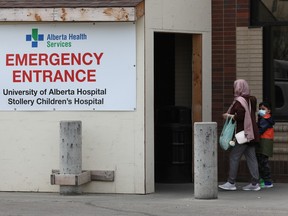
Article content
After nearly three years of a devastating global pandemic, our health-care system is hanging on by a thread. The consequences of 30 months of policymakers ignoring the calls of health-care workers across the country to protect our system are starkly in front of us.
Advertisements 2
Article content
Only now, do we see wait times higher than we’ve seen in decades, crowded hospitals with nowhere to discharge patients to, patients with chronic medical conditions who are getting sicker because their family doctors have left.
Article content
Welcome to the new normal. It won’t surprise anyone to hear me say this: Free and accessible health care is a fundamental human right. Why is it that we are treating this gift with such disrespect?
Let’s rewind back to the spring of 2020: A global pandemic had just been declared. Here in Canada, we learned quickly from what we saw around the world in places like New York and Italy. We take COVID-19 and the protection of our health-care system seriously. Frontline workers were deemed health-care heroes.
Advertisements 3
Article content
A matter of months later, somehow, the opinions of politicians and celebrities started to hold more value than the constant warnings from the actual experts: doctors, nurses, epidemiologists, and other scientists. This marked the beginning of a cascade of events that has chipped away at our health-care system.
Fast-forward to the start of 2023: We are in crisis. From primary care to acute care to continuing care, every aspect of the medical system that has been neglected and ignored is suffering from the lack of foresight by decision-makers. It’s not that they didn’t know. Do one quick search of news articles or social media posts over the last two years, and you’ll be bombarded with health-care workers constantly raising the alarm over the direction the system was heading — pleading with governments to pay attention, listen and act .
Advertisements 4
Article content
We are now at a point where millions of Canadians don’t have access to primary care, forced to present to the ER in crisis; where the emergency department wait times regularly approach the double digits and patients are dying in waiting rooms; where in-patient units are overflowing into hallways, because there are no community supports to facilitate safe discharge.
We are even at the point where surgeries are being canceled again because of the immense pressure being placed on the acute care system. This time, it’s not even because of COVID! This time, it’s a direct result of the decisions made by policy makers to ignore primary care, the foundation of our health-care system.
Decisions to focus on sexy promises like ICU beds and new hospitals — that can’t be staffed — because that’s what wins elections. Decisions to ignore the experts on the front lines telling them what needed to be done months ago to avoid this imminent collapse.
Advertisements 5
Article content
I’ve had numerous meetings with leaders, interviews with the media and conversations with colleagues recently. The most frequently asked question is, “how can we fix this now?” My answer is always the same, “we’ve exhausted our short-term solutions. The only way forward is to focus on the medium- and long-term solutions.”
Health-care workers have been resourceful and innovative, working for our patients within the system as it tightens around us. We have been working harder and longer seeing extra patients, picking up extra shifts, seeing patients in waiting rooms or in hallways, and advocating to anyone who will listen.
Unfortunately, human resources are limited. Any further short-term options will be on the backs of the health-care workers, who are already giving everything we can. So, now what? We are at a crucial juncture, where governments can decide to invest in medium- and long-term solutions that won’t have the instant success headlines that drive up approval ratings.
Advertisements 6
Article content
We need to train, recruit and retain more health-care workers with a specific focus on expanding primary and community care. This is what saves people and money. This is what keeps patients healthy and out of expensive hospital care. This is what takes the pressure off of emergency departments and in-patient units.
These solutions aren’t quick or easy; we are well past that. It’s time for foresight and planning, without ego or politics. It’s time to put in the hard work to preserve our precious health-care system for generations to come.
Dr. Shazma Mithani is an ER doctor working with both adult and pediatric patients in Edmonton and is an assistant clinical professor at the University of Alberta.

